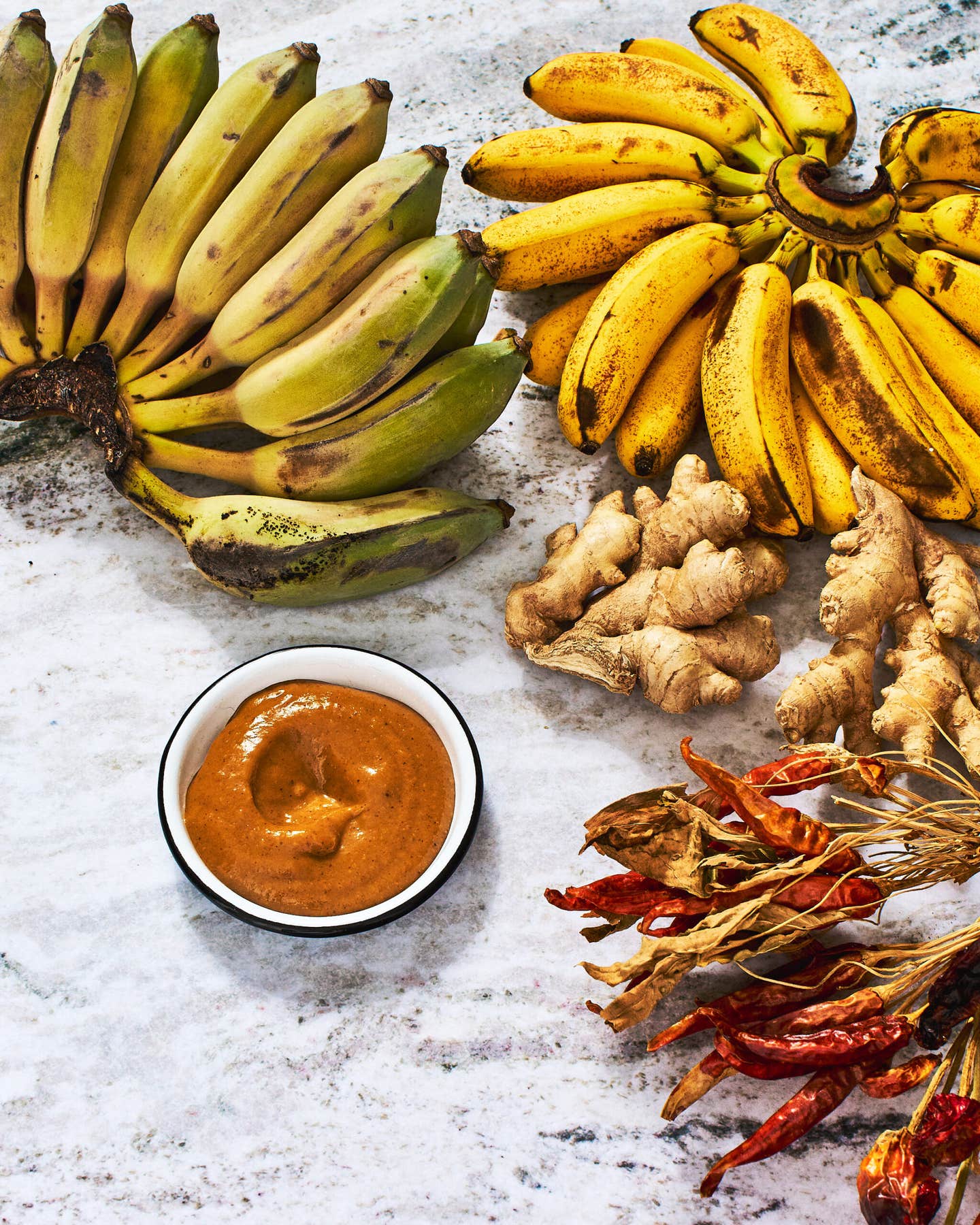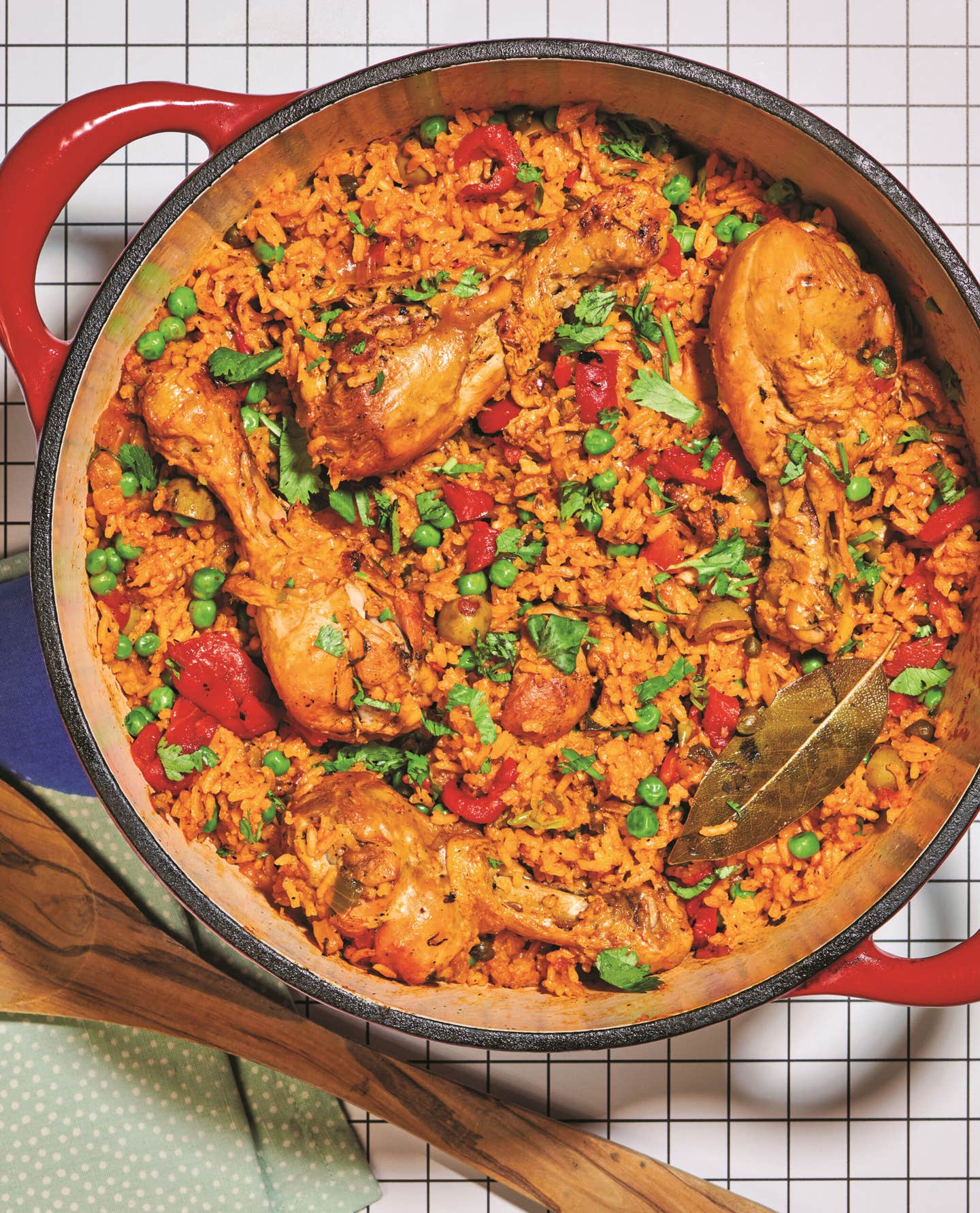
Caldo Verde: A Soup Full of Life
Revisiting a homestyle Portuguese soup and the woman who makes it.

“Kitty, take a picture,” Olivia said from her kitchen counter. She was looking at me sideways, her old chef’s knife in one hand, collard greens grasped tightly in the other. More of the greens were piled up on the cutting board below, and it looked as though she’d sliced her way through the whole mound as Lisbon’s pink light filtered in through the windows behind me.
In a millisecond, while efficiently cooking through two of my other childhood favorites (syrup-drenched orange torte and olive oil-fried cod croquettes), she’d staged the scene: old Portuguese lady (yes), working in a dated kitchen (yes), slicing through the last collard greens for caldo verde (done).
But the greens in Olivia’s hand were already shredded; caldo verde is so ubiquitous in Portugal that they’re sold pre-sliced and ready to go. And though the story I wanted to write didn’t account for such conveniences, Olivia improvised by giving me the picture and saving herself the trouble. Worse crimes have been committed in the name of photo styling. But few 83-year-old women that I’ve known have so instinctively understood editorial demands without prompting.

Caldo verde translates to “green broth,” but the rustic soup is actually made up of blanched and slivered collard greens that float in a creamy broth of pureed potatoes and onions. Unless you have to slice through all of those collards (something Olivia’s done many times), it actually comes together rather easily, too. Ladled into bowls, the greens, plus a few rounds of smoky chouriço (which Olivia drops into the pot at the very end), punctuate the quiet base, lending it bite and verdant appeal.

Reaching for those pre-sliced greens was one of just two concessions Olivia made over the two days we spent cooking together two Septembers ago. That was the last time I saw her, and as she staged this scene, I remembered exactly who she was: nobody’s fool. I laughed as I snapped the picture she’d staged, and she looked at me disapprovingly—I was meant to play along.
Olivia entered my family when I was three. My mother worked at the Portuguese embassy, my father was a trade law lawyer, and, at the time, I was the youngest of three kids. We met at my grandmother’s apartment in Lisbon, and when Olivia first appeared I marched right up to her and said, “I don’t like you.”
Soon thereafter, she came to the United States with us. She was in her late 40s and had worked with one other family before joining ours. But it’s ours with whom she crossed the Atlantic, and whose home she lived in for 12 years, working six days a week. For me, they were probably the best 12.

The arrangement sounds (and was) feudalistic, but Olivia recently said to me on a call from our respective pandemic lockdowns, “You know, I never felt far from Portugal during those years. There was a lot of work but I think I was happy.” On another call she told me that she’d dreamt of my parents (both now dead), recalling, “It was a house full of life.”
Of course we’ve also talked about the harder truths:. My mother had difficulty seeing people fully, especially those whom she loved most. My father inherited his mother’s Irish temper (I have some of it too) and the mood could turn combustible quickly. My two eldest brothers weren’t afraid of getting physical, and all of us, save Olivia, lacked respect for each other. Still, every day bristled with energy and a messy sort of love that Olivia was a part of, understood, and, while she lived with us, organized and grounded. Missing those years is a sentiment she’s echoed often and it’s one I relate to, especially now as I wonder about family, my future, and the meaning of home.
My mother died six years ago and my father followed her a year later—both deaths were tragic and sudden. Ever since, Olivia’s been the closest link I have to my childhood. In the years following their deaths, I cast about year after year, struggling with the silence and grief. But as I floundered, Olivia showed me a gentler past to reference, and since then I’ve tried to drop my anchor there.
As we made caldo verde that late summer weekend, Olivia told me she went into domestic service after the death of her first husband, the love of her life. She spent a year living alone in their cottage before finding work in the home of an elderly Portuguese lady. After my father died, Olivia gave me a ring that this woman, who was strapped for cash, had given to her as compensation. I wish I could be as magnanimous as Olivia.
As she cooked, I asked more about her first husband and then about the second, Senior Manel—whom she met while living with us in Washington, D.C. I asked about her own family and childhood. Though Olivia seemed a little uneasy, she answered fully, explaining that she dropped out of school in the fourth grade to work and help her family (this bit, I always knew). But as the light softened and our conversation rambled, Olivia told me that her elder sister had died earlier that spring. One day, she said, after bathing her, Olivia walked her sister to the bedroom. While guiding her, Olivia walked backwards and did a little dance. Olivia paused to show me how she moved, shuffling her feet and swaying her hips this way and that. “Remember,” Olivia asked her sister, “Like our father did?” She then told me her father always sang and danced at home. Of course, I thought. In our home, when all was right, Olivia sang Portuguese folk songs from the kitchen. Sometimes, mood depending, my own father joined in, singing a verse as he passed through.
Olivia’s life hasn’t been easy, but she’s moved forward, always, with dignity and strength. Recently, I’ve winced as I’ve heard her ask far too few for far too little. And now, despite giving so much to so many for so long, she’s alone. It’s been over 10 months since this lethal pandemic began and Olivia hasn’t eaten a meal with another soul. Nor has she felt an embrace. Her 85th birthday has come and gone. Easter, Christmas, and New Year’s, too. The solitude is wearing on her.
The last time I saw Olivia, we sat down for caldo verde together.
As it finished simmering, I went to the stove. The onion and potato were soft and the water they’d cooked in had reduced. With a handheld blender, it all got whizzed up, turning smooth and off-white. As it simmered down further, thickening slightly, Olivia poured hot water over the greens that waited in a colander set in the sink. They steamed and collapsed as water washed over them, softening their flavor and texture instantly. Minutes later, she stirred the shredded leaves into the soup and a few fat-studded chouriço rounds—not many—followed. “Just to give some flavor,” Olivia explained. It all simmered together for an extra beat before Olivia tilted in a final slip of olive oil and tasted for salt. “I always salt at the end,” she said.
Olivia set the kitchen table quickly. The glistening orange roll and freshly fried croquettes were on platters in the table’s center. A small basket of bread held two fresh Portuguese rolls. Our soup bowls were set on plates at our respective settings, hers at one end, mine at the other. “It’s good,” Olivia said after taking her first spoonful. It was actually excellent.
Keep Reading
Continue to Next Story










